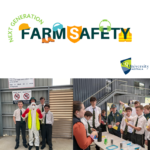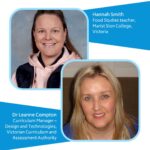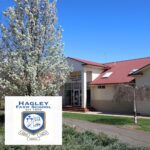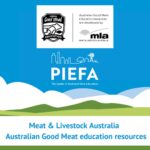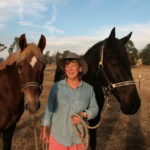It's on again!
WORKSHOP SESSION #3
MONDAY, MAY 1 @ 2:30pm
WORKSHOP TITLE: Farm Safety – Interactive activities to build knowledge and awareness of young people
HOST: CQUniversity Agri-tech Education and Extension team
Dr Nikki Kelly,
A/Prof Amy Cosby,
Dr Jaime Manning
Dr Nicole McDonald
TARGET AUDIENCE: Primary teachers; Secondary teachers; Industry Reps
WORKSHOP DESCRIPTION:
The Next Generation Farm Safety project is focused on building the capacity of primary and secondary school students, who will be the next generation of farmers, to understand risks and take appropriate actions to stay safe, and parents and teachers who are key influencers on young people’s attitude and behaviour. As Australian farms are often both a home and workplace to adults and children, it is important young people have the knowledge to make safe choices and mitigate risks. This workshop will introduce participants to the free online learning modules developed for 8 different farm safety topics which are not only relevant to commercial farms, but also school ag plots. Additionally, during the workshops teachers will undertake a series of short hands-on activities to see how they can incorporate farm safety practices into their teaching program in an interactive and engaging way.
HOST: CQUniversity Agri-tech Education and Extension team
Dr Nikki Kelly,
A/Prof Amy Cosby,
Dr Jaime Manning
Dr Nicole McDonald
TARGET AUDIENCE: Primary teachers; Secondary teachers; Industry Reps
WORKSHOP DESCRIPTION:
The Next Generation Farm Safety project is focused on building the capacity of primary and secondary school students, who will be the next generation of farmers, to understand risks and take appropriate actions to stay safe, and parents and teachers who are key influencers on young people’s attitude and behaviour. As Australian farms are often both a home and workplace to adults and children, it is important young people have the knowledge to make safe choices and mitigate risks. This workshop will introduce participants to the free online learning modules developed for 8 different farm safety topics which are not only relevant to commercial farms, but also school ag plots. Additionally, during the workshops teachers will undertake a series of short hands-on activities to see how they can incorporate farm safety practices into their teaching program in an interactive and engaging way.
WORKSHOP TITLE: Hands-on food – Curriculum mapping in Design and Technologies
HOST:
Dr Leanne Compton, Curriculum Manager – Design and Technologies, Victorian Curriculum and Assessment Authority
Hannah Smith, Food Studies teacher, Marist Sion College, Victoria
TARGET AUDIENCE: Secondary teachers
WORKSHOP DESCRIPTION:
We will show you how to use curriculum planning templates to effectively map content related to food and fibre production and food specialisations contexts in the Design and Technologies curriculum in a meaningful, practical and efficient manner. We will also show how these curriculum mapping tools can make meaningful links to the classroom activities from Marist Sion College, using specific hands-on examples from both Technologies Contexts. You will be provided with templates to take away to undertake mapping for your own teaching program, along with other useful teaching resources that will support your teaching practice for both Technologies contexts.
HOST:
Dr Leanne Compton, Curriculum Manager – Design and Technologies, Victorian Curriculum and Assessment Authority
Hannah Smith, Food Studies teacher, Marist Sion College, Victoria
TARGET AUDIENCE: Secondary teachers
WORKSHOP DESCRIPTION:
We will show you how to use curriculum planning templates to effectively map content related to food and fibre production and food specialisations contexts in the Design and Technologies curriculum in a meaningful, practical and efficient manner. We will also show how these curriculum mapping tools can make meaningful links to the classroom activities from Marist Sion College, using specific hands-on examples from both Technologies Contexts. You will be provided with templates to take away to undertake mapping for your own teaching program, along with other useful teaching resources that will support your teaching practice for both Technologies contexts.
WORKSHOP TITLE: Innovation in Tasmanian Agricultural Education
HOST:
WORKSHOP DESCRIPTION:
In 2015, a state government election commitment led to the establishment of the ‘Hagley Farm School Centre for Excellence in Agricultural Education’, a commitment resulting in an ongoing wave a of initiatives steadily improving food and fibre production – agricultural education and training pathways throughout Tasmanian government school and colleges.
Underpinning this wave of improvement is the Hagley Farm School Agricultural Learning Centre (ALC), one of 5 education department field study centres in Tasmania. The Hagley ALC, a highly valued part of the Tasmanian education system since 1976, is unique in its operations. The centre provides food and fibre learning experiences for over 5000 school aged students each year, with clear alignment to department strategy and guided by the seven priorities described within the Tasmanian Agricultural Education Framework.
This presentation will be presented in three short sections and explore the impact of an innovative collaboration between industry, education and government.
HOST:
- Claire Robertson, Tasmanian Farmers & Graziers Association – Kids to Farms
Tristan Bunker, Hagley Farm Agricultural Learning Centre (DECYP)
Andrew Harris, Development and Support (DECYP)
WORKSHOP DESCRIPTION:
In 2015, a state government election commitment led to the establishment of the ‘Hagley Farm School Centre for Excellence in Agricultural Education’, a commitment resulting in an ongoing wave a of initiatives steadily improving food and fibre production – agricultural education and training pathways throughout Tasmanian government school and colleges.
Underpinning this wave of improvement is the Hagley Farm School Agricultural Learning Centre (ALC), one of 5 education department field study centres in Tasmania. The Hagley ALC, a highly valued part of the Tasmanian education system since 1976, is unique in its operations. The centre provides food and fibre learning experiences for over 5000 school aged students each year, with clear alignment to department strategy and guided by the seven priorities described within the Tasmanian Agricultural Education Framework.
This presentation will be presented in three short sections and explore the impact of an innovative collaboration between industry, education and government.
WORKSHOP TITLE: Meat & Livestock Australia in association with PIEFA presenting Australian Good Meat education resources
HOST: PIEFA
Allison Arnott, Manager Resource Development and Curriculum Services
Sarah Barton, Education Officer
Jayne Johns, Education Officer
TARGET AUDIENCE: Primary teachers, Secondary teachers
WORKSHOP DESCRIPTION:
Explore the engaging, hands-on, cross-curricular Australian Good Meat educational resources in this workshop. Throughout this session, the PIEFA team will showcase selected activities from the recently released Foundation to Year 10 Australian Good Meat educational resources as well as scaffolded activities analysing current research in the red meat industry, practical tasks and technologies that can be used in the senior school years. This session is targeted at primary and secondary educators and will offer participants practical pedagogical approaches to incorporating food and fibre learning into multiple areas of the Australian Curriculum.
HOST: PIEFA
Allison Arnott, Manager Resource Development and Curriculum Services
Sarah Barton, Education Officer
Jayne Johns, Education Officer
TARGET AUDIENCE: Primary teachers, Secondary teachers
WORKSHOP DESCRIPTION:
Explore the engaging, hands-on, cross-curricular Australian Good Meat educational resources in this workshop. Throughout this session, the PIEFA team will showcase selected activities from the recently released Foundation to Year 10 Australian Good Meat educational resources as well as scaffolded activities analysing current research in the red meat industry, practical tasks and technologies that can be used in the senior school years. This session is targeted at primary and secondary educators and will offer participants practical pedagogical approaches to incorporating food and fibre learning into multiple areas of the Australian Curriculum.
WORKSHOP TITLE: Biosecurity in schools
HOST:
Sally Bannerman, Schools Animal Welfare Coordinator, NSW Department of Education, Catholic Schools NSW, Association of Independent Schools of NSW
TARGET AUDIENCE: Primary teachers; Secondary teachers; Careers Advisors
WORKSHOP DESCRIPTION:
2022 was busy year for disease transmission with Foot and Mouth Disease confirmed in livestock in Bali, the cattle disease, Lumpy Skin was reported in Sumatra and Singapore and cases of Japanese encephalitis were detected in mainland Australia. These outbreaks of disease have created an increased need for every Australian to be aware of how diseases are transmitted and what we can all do to stop their transmission. Failure to protect our biosecurity will have economic, environmental and social for the whole of our community.
Schools are high risk environments for the transmission of diseases and incidences of diseases have already impacted some schools in NSW. Schools need to take the risk of disease transmission seriously, understand control measures, follow appropriate procedures and educate their students about the risks and practices to reduce the outbreak and spread of diseases.
This session will examine some of the biosecurity risks faced by schools and what measures each school should be taking to reduce the risks. The advice provided in this session will be factual and practical and give strategies for making biosecurity the business of the whole school.
HOST:
Sally Bannerman, Schools Animal Welfare Coordinator, NSW Department of Education, Catholic Schools NSW, Association of Independent Schools of NSW
TARGET AUDIENCE: Primary teachers; Secondary teachers; Careers Advisors
WORKSHOP DESCRIPTION:
2022 was busy year for disease transmission with Foot and Mouth Disease confirmed in livestock in Bali, the cattle disease, Lumpy Skin was reported in Sumatra and Singapore and cases of Japanese encephalitis were detected in mainland Australia. These outbreaks of disease have created an increased need for every Australian to be aware of how diseases are transmitted and what we can all do to stop their transmission. Failure to protect our biosecurity will have economic, environmental and social for the whole of our community.
Schools are high risk environments for the transmission of diseases and incidences of diseases have already impacted some schools in NSW. Schools need to take the risk of disease transmission seriously, understand control measures, follow appropriate procedures and educate their students about the risks and practices to reduce the outbreak and spread of diseases.
This session will examine some of the biosecurity risks faced by schools and what measures each school should be taking to reduce the risks. The advice provided in this session will be factual and practical and give strategies for making biosecurity the business of the whole school.
WORKSHOP TITLE: The Canned Chick Pea Challenge
HOST:
Camille Mangan, Level Three Classroom Teacher, WA Department of Education – Cannington Community College
TARGET AUDIENCE: Secondary teachers; Secondary Food Specialisation or Food and Fibre Teachers
WORKSHOP DESCRIPTION:
I often get asked the question: How do you apply STEM in your teaching? The answer lies in using attributes that are future-focused. We apply STEM pedagogy for creativity, imagination, sustainability, and seeking a solution that is fit for purpose and doing it cost-effectively.
My workshop will show how it can be done in ways that offer simple solutions for everyone.
Use every aspect of the canned chickpeas. Watch the protein test to predict its suitability as a foam. Discuss how to use the ‘aqua faba’ to create one of two recipes. Research a simple chick pea recipe. Finally, you will brainstorm how to convert the can into something useful. Research questions focus on Technologies and Society.
This workshop will summarise a 4-6 hour module delivered within the year 10 unit ‘Food for Futures’.
HOST:
Camille Mangan, Level Three Classroom Teacher, WA Department of Education – Cannington Community College
TARGET AUDIENCE: Secondary teachers; Secondary Food Specialisation or Food and Fibre Teachers
WORKSHOP DESCRIPTION:
I often get asked the question: How do you apply STEM in your teaching? The answer lies in using attributes that are future-focused. We apply STEM pedagogy for creativity, imagination, sustainability, and seeking a solution that is fit for purpose and doing it cost-effectively.
My workshop will show how it can be done in ways that offer simple solutions for everyone.
Use every aspect of the canned chickpeas. Watch the protein test to predict its suitability as a foam. Discuss how to use the ‘aqua faba’ to create one of two recipes. Research a simple chick pea recipe. Finally, you will brainstorm how to convert the can into something useful. Research questions focus on Technologies and Society.
This workshop will summarise a 4-6 hour module delivered within the year 10 unit ‘Food for Futures’.
Get Involved
Will you help change the future of agriculture?
Support ag studies & food and fibre education across all grades of Australian school.
Get our free resources
Sign up for new resources, teaching tools & food / fibre educational materials!

